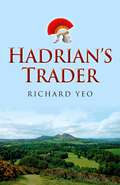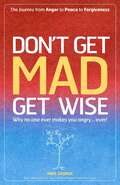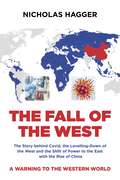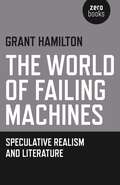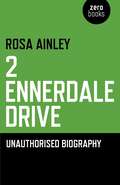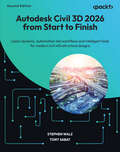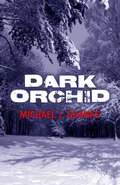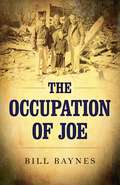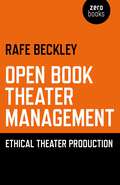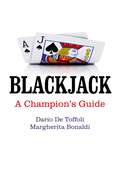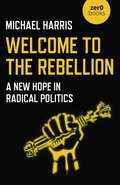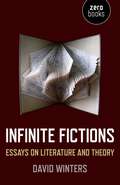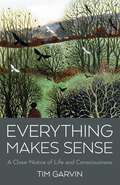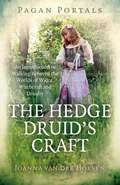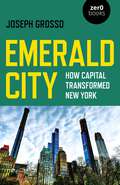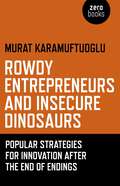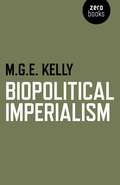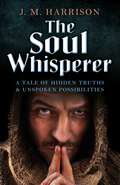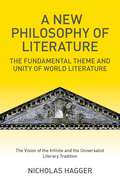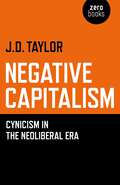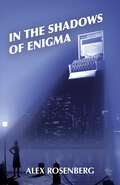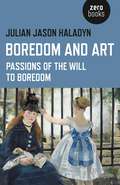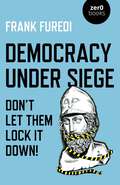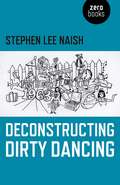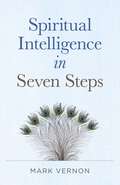- Table View
- List View
Hadrian's Trader
by Richard YeoLucius is a young Centurion in the time of Hadrian, serving at Trimontium, modern-day Melrose in southern Scotland. Trista is a Roman patrician girl, living in Gaul. She is orphaned and becomes a vagrant when her parents are killed by traitors plotting to overthrow the emperor. Following the death of his wife, Lucius becomes an imperial agent, operating beyond the borders of the Empire as a trader, seeking signs of invasion. He meets Trista who is under threat of assassination. The story follows their flight across Gaul, pursued by evil forces, to the German forests in a race to avert invasion and the death of the emperor.
Don't Get MAD Get Wise: Why No One Ever Makes You Angry, Ever!
by Mike GeorgeAnalyzes the illusions we have created for ourselves that justify our anger. We can draw on our own inner resources to heal its scars and focus on forgiveness for ourselves and others.
The Fall of the West: The Story behind Covid, the Levelling-Down of the West and the Shift of Power to the East with the Rise of China
by Nicholas HaggerIn The Syndicate (2004) Nicholas Hagger described how in the 20th century a Syndicate of élitist mega-rich families levelled down the leading Western countries by promoting revolutions, wars and independence movements against their empires, and planned a New World Order and world government that would control the earth's resources for their own benefit. In The Secret History of the West (2005) he traced the Syndicate's roots back to secret Freemasonic organisations and revolutions that undermined the West from the Renaissance to the early 20th century. In The Fall of the West (2022), the third book in his trilogy on the West, Hagger updates the story to include the pandemic and describes how Syndicate-driven 21st-century events from the War on Terror to Covid have brought the Western financial system to the brink of collapse and shifted power from the West to the East, and China. In this first impartial attempt to assemble all the evidence to date for the origin of Covid (like fitting together available pieces of a jigsaw to reveal the main picture) Hagger, the first to discover the Cultural Revolution in China in March 1966, finds that the three main features of Covid-19 were man-made by American NIAID-funded medics in 2002 and patented 73 times since 2008, and seem to have been surreptitiously used as a bio-weapon in a Syndicate plan to limit the rise of China and its expanding trade. A dangerous new Biological Age has been born, and the West faces being levelled down and a sudden fall. Hagger sees the post-Covid West's dream of creating a good New World Order - a vaccine-protected democratic, presidential, part-federal world government and World State with sufficient authority to abolish war and solve the world's post-Covid problems - as being challenged by the self-interested Syndicate's levelling-down; and to survive, it first has to go along with the Syndicate's plan for West and East to draw together into an authoritarian world government involving China, and democratise later. This is a thought-provoking work with a prophetic vision of the future.
The World of Failing Machines: Speculative Realism and Literature
by Grant HamiltonThe World of Failing Machines offers the first full-length discussion of the relationship between speculative realism and literary criticism. In identifying some of the most significant coordinates of speculative-realist thought, this book asks what the implications might be for the study of literature. It is argued that the first casualty might well be the form of the traditional essay.
2 Ennerdale Drive: An Unauthorised Biography
by Rosa Ainley2 Ennerdale Drive is a memoir of a house and the family that lived there; a work of text and image encompassing architecture, social and personal history, town planning, photography and representation, carving a space within and between new forms of memoir, cultural studies and creative non-fiction.
Autodesk Civil 3D 2026 from Start to Finish: Learn dynamic, automation-led workflows and intelligent tools for modern civil infrastructure designs
by Stephen Walz Tony SabatDesign civil infrastructure faster and boost collaboration with Autodesk Civil 3D 2026's new autonomous workflows that optimize delivery as an individual, team, or organization. Bonus 1: Access chapter-by-chapter video tutorials on YouTube—follow along visually with every topic covered in the book. Bonus 2: Download exercise files to practice each concept with real-world projects and reinforce your hands-on learning.Key FeaturesMaster the latest features and interface updates in Civil 3D 2026 to streamline modern infrastructure workflowsScale your workflows to larger teams and bigger projects while maximizing efficiencyLearn how to work with enhanced modeling, corridor targeting, and pressure toolsPurchase of the print or Kindle book includes a free PDF eBookBook DescriptionWith engineering projects getting bigger, deadlines getting tighter, and greater demands for precision, you need tools that do more and work smarter. Autodesk Civil 3D 2026 rises to the challenge, delivering powerful new capabilities for high-precision design modeling and streamlined collaboration. In this second edition, Stephen Walz and Tony Sabat, leaders in digital design and innovation in civil infrastructure, walk you through Civil 3D’s cutting-edge features, such as pressure layout improvements, dynamic corridor targeting, and performance enhancements for surface modeling and grading. It’s not just about learning new features; you’ll be able to integrate these new toolsets into real-world workflows, develop standards, and collaborate effectively within distributed teams. From surface development and intelligent utility design to smart document creation, this book explores practical and automated applications of tools and modeling techniques that you’ll use every day. Whether you work independently or are part of a large design team, you’ll walk away knowing how to configure, manage, and deliver projects with Civil 3D 2026 while improving your entire project pipeline.What you will learnCreate and manage surfaces, alignments, and profilesImport and organize survey data for accurate base mapsDesign roadways, parcels, and utility networksStreamline design with Model Viewer, Dynamo, and Targeted Data ReferencesEliminate redundancy using intelligent, dynamic Civil 3D objectsOptimize 3D modeling to improve design decisions and outcomesAutomate sheet creation for profiles and sectionsModel advanced corridor features such as intersections and railsWho this book is forThis book is for civil engineers, environmental engineers, civil designers, civil technicians, and professionals working with Civil 3D or InfraWorks who want to maximize Civil 3D’s potential in their everyday design work. To get the most out of this guide, you'll need a basic understanding of civil engineering and surveying workflows, along with foundational knowledge of Autodesk AutoCAD. General familiarity with surveying practices, civil/environmental engineering practices, and AutoCAD drafting is assumed.
Dark Orchid
by Michael J. ShanksEveryone wants to do the right thing. Sometimes doing the right thing can lead you down a path from which there is no return. Follow Galston McGee and James Bisset as they journey through 1970s Glasgow, white-collar fraud and organised crime. As their lives intersect, the consequences are deadly and catastrophic. Dark Orchid is a fast-paced story of love, greed, resurrection and revenge.
Occupation of Joe
by Bill BaynesTokyo, 1945. A Japanese boy too old for his years, a survivor of the American firebombing, dares to cross the wasteland where he saw thousands burn to death, and approach the occupying forces to get food for his family. A young Navy lieutenant, proud of the Allied victory but appalled by the devastation he sees across the city, cares enough to help. As post-war pressures mount between the two cultures, he becomes entangled in the lives of the boy, his infant sister and his beautiful mother. The Occupation of Joe is an emotionally powerful, gripping post-war tragedy from Top Hat Books, publisher of quality historical fiction.
Open Book Theater Management: Ethical Theater Production
by Rafe BeckleyIn the world of Fringe (or Off-Off Broadway) theatre, a strong debate has been raging for years - when you're producing a low/no-budget production, how on earth can you make it happen and still treat everyone involved in an open, honest and ethical manner? Where do you stand with profit-share productions when you can't afford to pay Union minimums? Open Book Theatre Management, along with its free online resources of instructional budget spreadsheets, is the first book ever to show you exactly how to mount a theatre production without losing either your integrity or your shirt. It is aimed at actors, directors and producers in the early stages of their careers; drama schools; and further and higher education establishments. The methodologies outlined in the book are transferable across all countries in which arts funding is difficult to secure. The time for going to the Establishment with the begging bowl is over. There need be no more excuses. The author will even show you how to start your own theatre company for only a tenner…
Blackjack: A Champion's Guide
by Dario De Toffoli Margherita BonaldiIf you believe that winning at casino games depends entirely on chance or luck, then this is not the book for you. If, on the other hand, you think that it's crucial to have an effective strategy in order to win, then you simply can't do without it. The green table is the most democratic place to play, where the inequalities between you and the dealer are at a minimum and players can significantly increase their chances of victory. You just need to know how. Simply told and with a touch of irony, 'games king' Dario De Toffoli guides us through rules, secrets, tactics and advice, in a book that is as much for beginners as experts. So prepare yourselves to explore the world of Blackjack, which is 'deconstructed' and analysed in all its mathematical glory for the first time, making readers more conscious and successful when they play. Whether you are in front of a croupier in the flesh and blood or in front of your computer screen playing an online game, now is the time to abandon all those good luck charms and understand that your success depends on you. Because it's fun to play, but it's even more fun to win. So, what are you waiting for? Play the game, but don't let the game play you...
Welcome to the Rebellion: A New Hope In Radical Politics
by Michael HarrisWhat does it mean that our most popular modern myth is a radical left story about fighting corporate authoritarianism? From its roots in the 1960s new left, Star Wars still speaks to millions of people today. By design, the saga mirrors our own time and politics. A real empire of corporate domination has arisen within weakened and corrupted republics. Now it threatens our existence on a planetary scale. But the popularity of Star Wars also suggests that if we tell the right stories, we can welcome many more people to the rebellion and the fight for a better world...
Infinite Fictions: Essays on Literature and Theory
by David WintersDavid Winters has quickly become a leading voice in the new landscape of online literary criticism. His widely-published work maps the furthest frontiers of contemporary fiction and theory. The essays in this book range from the American satirist Sam Lipsyte to the reclusive Australian genius Gerald Murnane; from the "distant reading" of Franco Moretti to the legacy of Gordon Lish. Meditations on style, form and fictional worlds sit side-by-side with overviews of the cult status of Oulipo, the aftermath of modernism, and the history of continental philosophy. Infinite Fictions is indispensable reading for anyone interested in the forefront of literary thought.
Everything Makes Sense: A Close-Notice of Life and Consciousness
by Tim Garvin'This book is a gift that will allow ready seekers to forego years of preoccupation with trifling intellectual distractions and get on with close-notice of life and consciousness.' Peter Nordeen, historian of the life and work of Avatar Meher Baba, writer and producer of God in Human Form and other films for Meher FilmworksScience and religion study the same phenomenon - the cosmos itself - but an impenetrable barrier seems to separate them. Author Tim Garvin removes that barrier and offers a resonant handshake. Instead of sitting across from each other in opposition, scientists and seekers can sit at a table made round by wonder. As Everything Makes Sense dives into the nature of knowing and existence, it reveals a mutuality in humankind unimagined by theology or biology, a mutuality in the nature of being itself. From there, Everything Makes Sense develops an explanation of existence by employing the thought and insight of the inner world's two most penetrating cartographers, Aurobindo Ghose and Meher Baba, whose work and a close-notice of life itself reveal the deep purpose of creation.
Pagan Portals - The Hedge Druid's Craft: An Introduction to Walking Between the Worlds of Wicca, Witchcraft and Druidry
by Joanna van HoevenThe Hedge Druid's Craft blends the traditions of Wicca, Witchcraft and Druidry into a spiritual path that uses the techniques of "hedge riding" to travel between the worlds, bringing back wisdom and enchantment into our everyday lives. It is about working with boundaries, with a foot in either world, living around the edges and working with liminal times and places. For those whose paths meander and often overlap, and those who would not be constrained nor confined by labels, yet who seek some definition, this book is for you. If you are interested in Witchcraft, Wicca or Druidry, this book will sing to your soul.
Emerald City: How Capital Transformed New York
by Joseph GrossoFresh, lively, accessible, Grosso brings the issues of gentrification, deindustrialization, homelessness, and militarized policing, so easily ignored, to the fore.Joseph Grosso traces the history of New York's transformation back into a gilded city, and asks what can be done about it. He examines New York's deindustrialization and the elite planning and design that followed; New York's financial crisis of the mid-1970s and the policy decisions made in its wake; New York's housing crisis; and the history of public housing across the United States. Making the history of gentrification and deindustrialization widely available and understood is a crucial tool in combating housing crises which continue to spread in cities around the world as more and more houses are left empty, to be used for global investments instead of for living.
Rowdy Entrepreneurs and Insecure Dinosaurs: Popular Strategies for Innovation After the End of Endings
by Murat KaramuftuogluRowdy Entrepreneurs and Insecure Dinosaurs is about invention and innovation in the context of postmodern society and information economy. It applies "popular culture" theory to such companies as Virgin, Microsoft, and Apple, to analyse their innovation strategies. This is the first book of its kind that mingles popular culture theory with innovation theory and entrepreneurship. It is written, true to the spirit of popular culture, in a lively style with abundant popular cultural references, and textual and visual puns.
Biopolitical Imperialism
by M. G. KellyBiopolitical Imperialism is a book about international politics today. The core, eponymous thesis is that our world is marked by a pattern of biopolitical parasitism, that is, the enhancement of the life of wealthy populations of First World countries on the basis of an active denigration of the lives of the poor mass of humanity. The book details how this dynamic plays out both inside wealthy countries and internationally.
The Soul Whisperer: A Tale of Hidden Truths and Unspoken Possibilities
by J. M. HarrisonFollowing personal tragedies and spiralling financial problems, Londoners Alex and Sara are desperate to find ways to rediscover their zest for life. A free holiday provides the perfect opportunity for a second chance, but not long after arriving in France they discover that all is not what it seems... A series of shocking revelations challenge their understanding of humanity, as they are propelled into a dangerous world governed by a ruthless occult society. Magical relics and extra-terrestrial objects promise to unlock incredible secrets, but what extremes will people go to in order to attain them? In a modern-day spiritual quest, Alex and Sara will be forced to take control of their destiny, facing their own demons along the way as time counts down, for them and the entire human race…
A New Philosophy of Literature: The Fundamental Theme and Unity of World Literature: the Vision of the Infinite and the Universalist Literary Tradition
by Nicholas HaggerIn The New Philosophy of Universalism Nicholas Hagger outlined a new philosophy that restates the order within the universe, the oneness of humankind and an infinite Reality perceived as Light; and its applications in many disciplines, including literature. In this work of literary Universalism, which carries forward the thinking in T.S. Eliot&’s &‘Tradition and the Individual Talent&’ and other essays, Hagger traces the fundamental theme of world literature, which has alternating metaphysical and secular aspects: a quest for Reality and immortality; and condemnation of social vices in relation to an implied virtue. Since classical times these two antithetical traditions have periodically been synthesised by Universalists. Hagger sets out the world Universalist literary tradition: the writers who from ancient times have based their work on the fundamental Universalist theme. These can be found in the Graeco-Roman world, the Middle Ages and Renaissance, in the Baroque Age, in the Neoclassical, Romantic Victorian and Modernist periods, and in the modern time. He demonstrates that the Universalist sensibility is a synthesis of the metaphysical and secular traditions, and a combination of the Romantic inspired imagination (the inner faculty by which Romantic poets approached the Light) and the Neoclassical imitative approach to literature which emphasizes social order and proportion, a combination found in the Baroque time of the Metaphysical poets, and in Victorian and Modernist literature. Universalists express their cross-disciplinary sensibility in literary epic, as did Homer, Virgil, Dante and Milton, and in a number of genres within literature – and in history and philosophy. Universalist historians claim that every civilisation is nourished by a metaphysical vision that is expressed in its art, and when it declines secular, materialist writings lose contact with its central vision. As Universalist literary works restate the order within the universe, reveal metaphysical Being and restore the vision of Reality, Hagger excitingly argues that the Universalist sensibility renews Western civilisation&’s health. Literary Universalism is a movement that revives the metaphysical outlook and combines it with the secular, materialistic approach to literature that has predominated in recent times. It can carry out a revolution in thought and culture and offer a new direction in contemporary literature. This work conveys Universalism&’s impact on literature, and should be read by all who have concerns about the sickness and decline of contemporary European/Western culture.
Negative Capitalism: Cynicism in the Neoliberal Era
by J.D. TaylorNegative Capitalism: Cynicism in the Neoliberal Era offers a new conceptual framework for understanding the current economic crisis. Through a ranging series of analyses and perspectives, it argues that cynicism has become culturally embedded in the UK and US as an effect of disempowerment by neoliberal capitalism. Yet despite the deprivation and collapse of key social infrastructure like representative democracy, welfare, workers' rights and equal access to resources, there has so far been no collective, effective and sustained overthrow of capitalism. Why is this? The book's central call is for new strategies that unravel this narcissistic cynicism, embracing social democracy, constitutional rights, mass bankruptcies and animate sabotage. Kafka, Foucault, Ballard and de Sade are clashed with the X-Factor, ruinporn, London, and the artwork of Laura Oldfield Ford. Negative Capitalism's polemic is written to incite responses against the cynical malaise of the neoliberal era.
In the Shadows of Enigma: A Novel
by Alex RosenbergIn this standalone sequel to The Girl From Krakow, the greatest undisclosed secret of the Second World War haunts the lives of four people across three continents and fifteen years. The only Second World War secret not revealed soon thereafter was that the Allies had broken the German Enigma codes. This secret was kept for 30 years after the war. In the Shadows of Enigma is a 15 year-long narrative of how knowing the secret changed the lives of four people: Rita Feuerstahl, who learned that the German Enigma had been deciphered by the Poles just before she escaped a Polish ghetto, Gil Romero, her prewar lover whom Rita marries after the war, Stefan Sajac, the infant son Rita had smuggled out of the ghetto and lost track of, and Otto Schulke, the German Gestapo detective who apprehended Rita during the war and suspected that she knew the secret of the Enigma's decoding.
Boredom and Art: Passions Of The Will To Boredom
by Julian Jason HaladynBoredom and Art examines the use of boredom as a strategy in modern and contemporary art to resist or frustrate the effects of consumerism and capitalism. This book traces the emergence of what Haladyn terms the will to boredom in which artists, writers and philosophers actively attempt to use the lack of interest inherent in the state of being 'bored' to challenge people. Instead of accepting the prescribed meanings of life given to us by consumer or mass culture, boredom represents the possibility of creating meaning: &‘a threshold of great deeds&’ in Walter Benjamin&’s memorable wording. It is this conception of boredom as a positive experience of modern subjectivity that is the main critical position of Haladyn's study, in which he proposes that boredom is used by artists as a form of aesthetic resistance that, at its most positive, is the will to boredom.
Democracy Under Siege: Don't Let Them Lock It Down!
by Frank FurediDemocracy Under Siege outlines the long history of anti-democratic thought, explains why hostility to democracy has gained momentum in the current era, and offers a positive affirmation of the principle and the value of democracy.Frank Furedi examines the frequent claim that democracy is a means to an end rather than an important value in and of itself. The prevalence of this sentiment in the current era is not surprising, given that the normative foundation for democracy is fragile, and there is little cultural valuation for this outlook. Until recently, virtually every serious commentator paid lip-service to democracy. However, in recent times the classical elitist disdain for democracy and for the moral and intellectual capacity of the electorate has acquired a powerful influence over public life.
Deconstructing Dirty Dancing
by Stephen Lee NaishRenowned film critic Roger Ebert said Dirty Dancing "might have been a decent movie if it had allowed itself to be about anything." In this broadly researched and accessible text, Stephen Lee Naish sets out to deconstruct and unlock a film that has haunted him for decades, and argues that Dirty Dancing, the 1987 sleeper hit about a young middle-class girl who falls for a handsome working-class dance instructor, is actually about everything. The film is a union of history, politics, sixties and eighties culture, era-defining music, class, gender, and race, and of course features one of the best love stories set to film. Using scene-by-scene analyses, personal interpretation, and comparative study, it's time to take Dirty Dancing out of the corner and place it under the microscope.
Spiritual Intelligence in Seven Steps
by Mark VernonWe live in an age of emergency, exacerbated by a collapse of meaning. Writer and psychotherapist Mark Vernon examines the type of intelligence that, whilst often dismissed and overlooked, is crucial to understand and cultivate if we are to survive and thrive in our times. Spiritual intelligence is the foundation of who we are and our particular type of consciousness. It is the perception identified across wisdom and religious traditions, and known by many names, which can be summarised as the awareness of awareness, and so of being itself. It is the foundation of peace, even in the face of death, as well as purpose and solidarity. The challenge today is to recover and live according to that knowledge. Examining themes from the nature of consciousness to the experience of time, the emergence of our species and the teaching of spiritual adepts, the book is an antidote to rampant AI and a complement to emotional intelligence. It is written without presuming religious commitments in readers and draws on a mix of sources and experience gained from the author's own practices. It advocates pilgrimage and improvisation, virtues over morality, and big histories that do not turn the story of our species into a bleak struggle for survival. The seven steps will help readers identify spiritual intelligence within themselves, unpack why it matters, and suggest how a wider trust in it may be revived.
